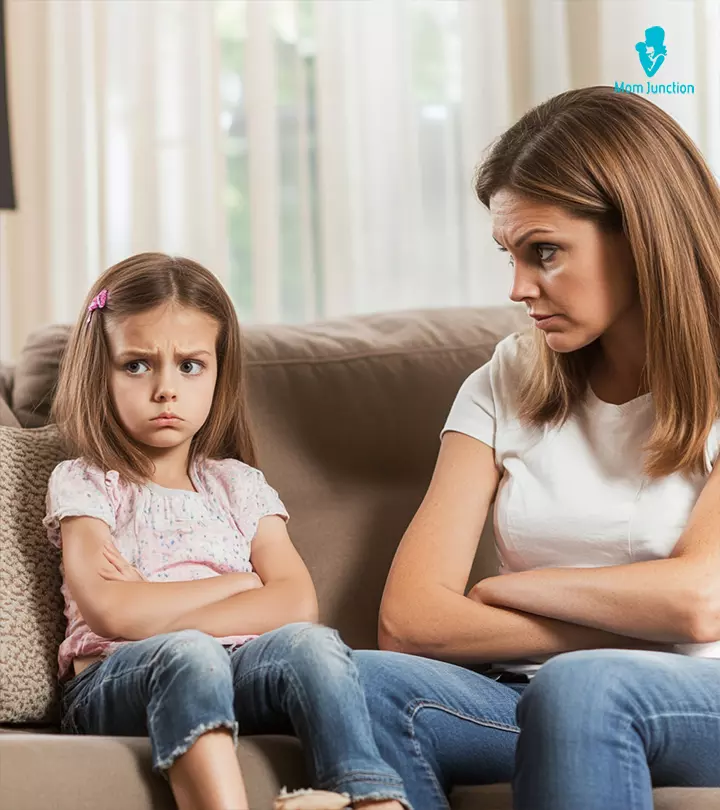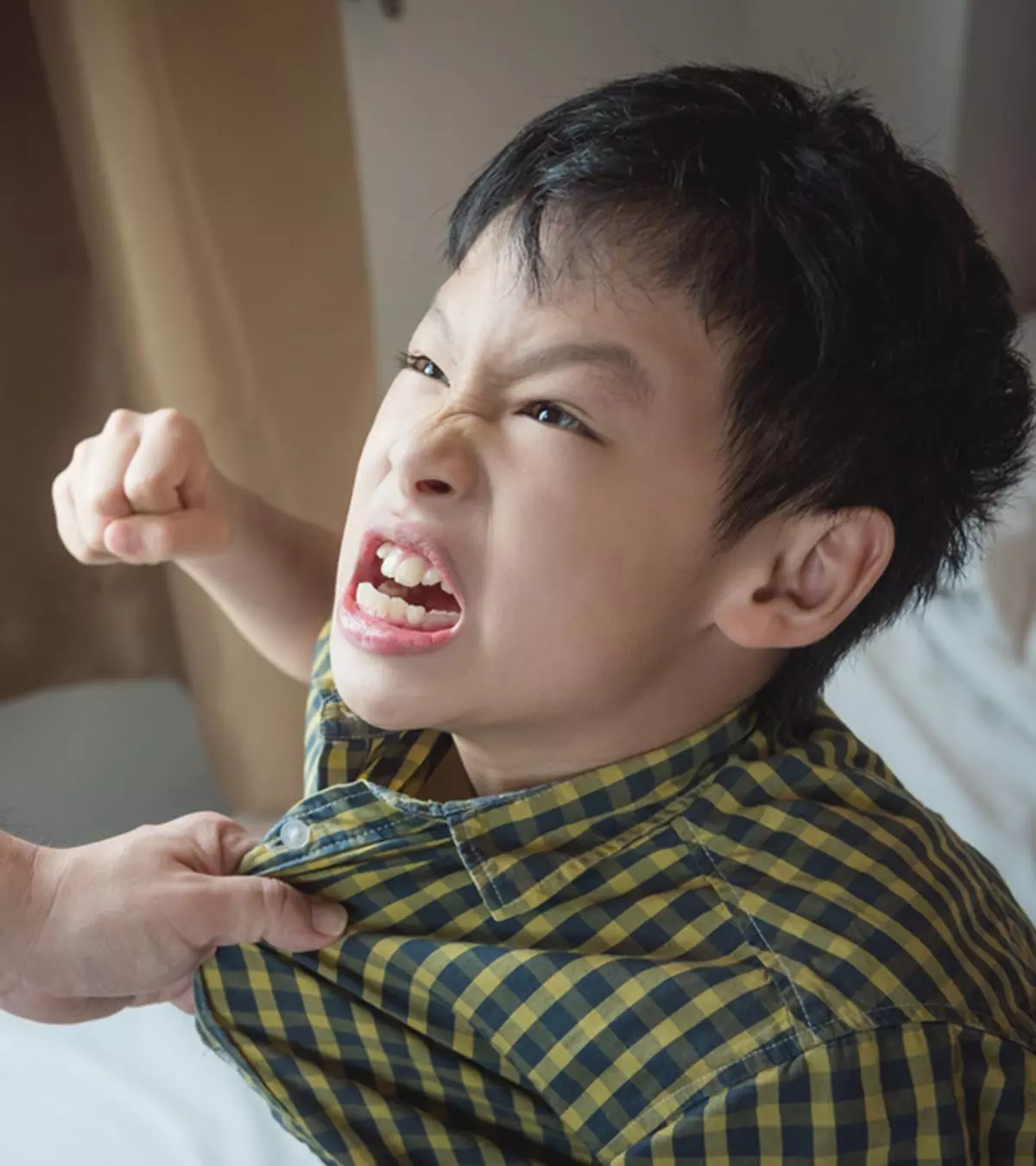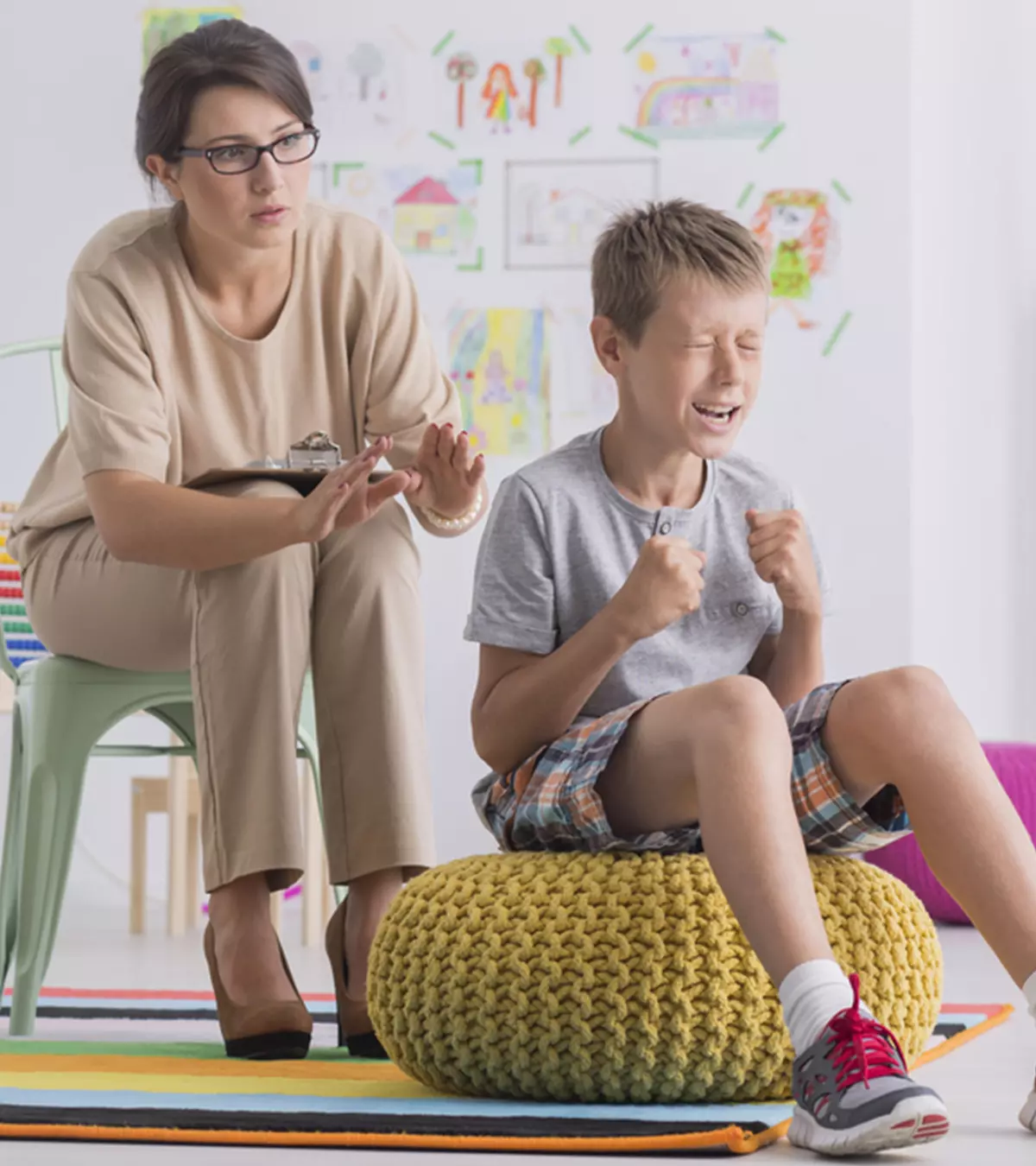
Image: Shutterstock
Most parents worry because their children struggle to control aggression in adolescence. During teenage, children go through numerous physical, social, and emotional changes (1). These sudden changes create uncertainty and confusion in their young minds. As a result, they reevaluate their purpose and role in the family and society. If they do not find satisfactory answers, these feelings may transform into aggression.

Moreover, sometimes, children experience trauma, peer pressure, or low self-esteem, increasing their anxiety. Therefore, parents need to observe their adolescent children and support them through counseling, medication, therapy, and other techniques.
Read this post to understand the causes of aggression in adolescents and how to help them channel their emotions properly.
Key Pointers
- Adolescent aggression stems from various causes, including physiological alterations, traumatic experiences, and social influences.
- Teenagers may also exhibit aggressive behavior due to numerous triggers such as substance abuse, ADHD, low self-esteem, and psychological distress.
- Addressing aggressive behavior in adolescents may include therapy, family counseling, medications, behavior, and stress management techniques.
- Effective adolescent aggression management requires acknowledging behavior responsibility and developing coping strategies to handle stress.
8 Causes For Aggression In Adolescence
Over the years, experts have done a lot of research on aggression in adolescence and they have been able to identify several factors. Some of these factors are as follows:
1. Traumatic Event:
Death or illness of a loved one, divorce or extreme sibling and peer harassment is very stressful and can lead to aggression in teenagers (2). Even ongoing fights and discord in the family, especially among parents, can cause such a behavior.
 Did you know?
Did you know?2. Abuse:
Physical or sexual abuse is another reason for aggressive behavior among teenagers (3).
- This abuse makes them feel angry, inadequate and ashamed.
- Because they are unable to tell anyone about the abuse, it manifests in the form of aggression.
3. Psychiatric Disorders:

Some teenagers may suffer from psychiatric disorders, such as:
- Bipolar disorderiA mental illness that causes extreme shifts in mood energy, concentration, and activity levels. (4)
- Panic disorder (5)
- SchizophreniaiA mental illness that alters how a person thinks, feels, and behaves and may lead to hallucinations and delusions. (6)
- Depression (7)
- PTSD (8)
All these disorders cause aggressive behavior. In a report by the World Health Organization on adolescent mental health, approximately 3.6% of individuals between 10-14 years and 4.6% between 15-19 have anxiety disorders. Additionally, depression might affect 1.1% of adolescents aged 10 to 14 years and 2.8% of those aged 15 to 19.
4. Medical Disorders:
In several cases medical issues erupts the aggressive side in teenagers, as well.
- Brain damage, epilepsyiA brain disorder responsible for recurrent seizures. , mental retardation and Tourette’s syndromeiA medical disorder that makes a person make involuntary movements and sounds. are some of the other causes of disruptive and aggressive behavior among teenagers (9).
- With proper medical examination and diagnosis, these medical disorders can be treated and the aggression can be brought under control.
5. ADHD and Learning Disorders:
Teenagers suffering from learning disorders and ADHD have several social and emotional difficulties (10). This may come across as the teen being aggressive and angry.
6. Addiction and Abuse:

Many teenagers experiment with drugs and alcohol (11). However, when they become addicted or start abusing alcohol and drugs regularly, it can lead to aggressive behavior.
7. Peer Pressure:
Teenagers yearn to be accepted and become part of a group. If this does not happen, it can cause pain and anger, leading to aggressive teenage behavior.
8. Low Self-Esteem:
Some adolescents have low self-esteem and they try to cover this up through aggression. This is especially true when they are among their peers.
 Point to consider
Point to consider7 Solutions To Teenage Aggression
As a parent or caregiver, you have several options to take care of anger management in teens. It is important for you to understand the behavior and implement violence prevention or aggression reduction solutions for improvement. Some of these are as follows:
1. Counseling:

Take your teenager for individual counseling as part of youth counseling (12).
- Talking to a trained and licensed professional is recommended.
- This can make your adolescent take responsibility for their behavior and also resolve problems with their relationships.
- Cognitive-behavioral therapy has been well studied by researchers for its management of disruptive behaviors, emotional regulation, resilience, and self-control.
2. Family Counseling:
It could be a good idea to involve the whole family in counseling, also known as family therapy.
- Talking to one another and being guided by professional and trained therapists can be extremely helpful for conflict resolution.
- This can resolve conflicts and relationship problems that are causing aggressive behavior in your teenager.
3. Medication:
If the adolescent has been diagnosed with a psychiatric or neurological problem, like epilepsy or depression, taking the right prescription medication can reduce aggression.
4. Behavioral Contracts:

You can try and set up parenting strategies such as behavioral contracts with your teenagers, which force them to take responsibility for their behavior and conduct.
- List down positive behaviors that you expect and the reward they will earn for those behaviors as part of positive reinforcement.
- Do not offer material things as rewards.
- Instead, focus on natural consequences, such as going for a movie with friends or getting homework pass once a week.
5. House Rules:
Create a set of house rules that your adolescents have to follow whether they like it or not.
- Make the rules clear.
- Also let your teenager know that they will have to bear the consequences, if the rules are broken.
6. Relaxation Techniques:

Teach relaxation techniques to your teenagers to cope with their stress.
- If your teenager is burdened with homework or experiences extreme peer pressure, this will be quite useful.
- Also, in turn, this will help impulse control and ease aggressive behaviors.
- Teach them to use the techniques when they get angry and stressed.
 Quick tip
Quick tip7. Conflict Resolution Training
Conflict resolution training refers to programs or sessions that teach individuals or groups the techniques to effectively manage and resolve conflicts (13). Here’s how these training programs teach conflict resolution.
- Set a ground to have the teens come face-to-face and find a solution.
- Have them listen to each other’s perspectives and arguments without interrupting.
- Find common ground or interest for both parties, such as their willingness to resolve over a certain point.
- Brainstorm ideas with each teen to find a win-win solution for the problem.
- Talk about the resolution ideas with each other to reach an agreeable solution from both sides.
- Once they reach an agreement, you may have them write it down.
Schools, communities, and youth groups offer conflict resolution training. Enrolling your teenager in one such program can help them develop essential skills for managing conflicts in various aspects of their lives.
Frequently Asked Questions
1. What type of aggression is most common in late adolescence?
Physical aggression is reportedly most prevalent in early to late adolescence (14). Furthermore, boys are more likely to display physically aggressive behaviors due to a few risk factors, including smoking and alcoholism.
2. At what age does aggression peak?
A few studies showed that social and physical aggression might peak at around 14 and 15, respectively (15).
3. How do I help my daughter with relational aggression?
Listen out, be kind and empathetic to your daughter. Help her establish stable relationships with her peers and display appropriate social skills. Seek expert help if required to teach her effective behavioral strategies (16).
4. What are direct and indirect aggression?
Some examples of direct aggression are physical and verbal harm or threatening. On the contrary, indirect aggression includes social marginalization and gossiping behaviors (17).
5. What are the four types of aggression?
The four types of aggression are:
•Accidental aggression: Aggression not done on purpose
•Expressive aggression: Although there is still no intention to harm others, there is a sense of satisfaction from the aggressive act
•Hostile aggression: Aggression that is intentional and done to hurt another person, whether verbally, physically, mentally, or emotionally
•Instrumental aggression: Aggression that isn’t motivated by malice or the desire to harm others. Instead, there is an overlaying issue to be resolved (18).
6. Is aggression learned or inherited?
Both learned and hereditary aggression are possible. Studies show that genetic variables account for around half (50%) of the variance in aggressive behavior, while environmental factors account for the other half (50%). Children acquire destructive and damaging conduct and learn that aggressiveness is a successful way of attaining what they want by witnessing aggressive people around them – parents, peers, and television characters (19) (20).
7. What are some early signs of aggression in adolescents?
Short tempers, often caused by petty reasons, resorting to tantrums or screaming when annoyed with someone, and general irritability, could be early signs of aggression in adolescents. In some cases, the child might also display physical aggression. Early signs of aggression could greatly vary and may also be triggered by other factors. Therefore, check for triggers or potential causes before considering the adolescent innately aggressive.
Aggression in children is not uncommon due to several physical and hormonal changes they experience during adolescence. Apart from the physiologic causes, other pathologic causes may also lead to aggression in adolescent children. This time may be challenging for parents as they want to help their child but are often confused about how to deal with teenage attitude or how to help control aggression in their child. While you may try the solutions listed here, do not hesitate to seek therapy and other support for your adolescent child if you suspect their aggressive behavior needs medical attention. It is important for you to reduce the stigma associated with seeking therapy and enable mental health awareness for your child, establishing positive mental health.
Infographic: Solutions To Teenage Aggression
Aggression is a common and normal part of human behavior, but it can become a problem if it is not managed properly. Teenagers, in particular, may struggle with controlling their aggression, given their emotional, social, and physical changes. So this infographic is to help parents who struggle to control their teen’s anger with strategies to improve their social life and mental health. Illustration: Momjunction Design Team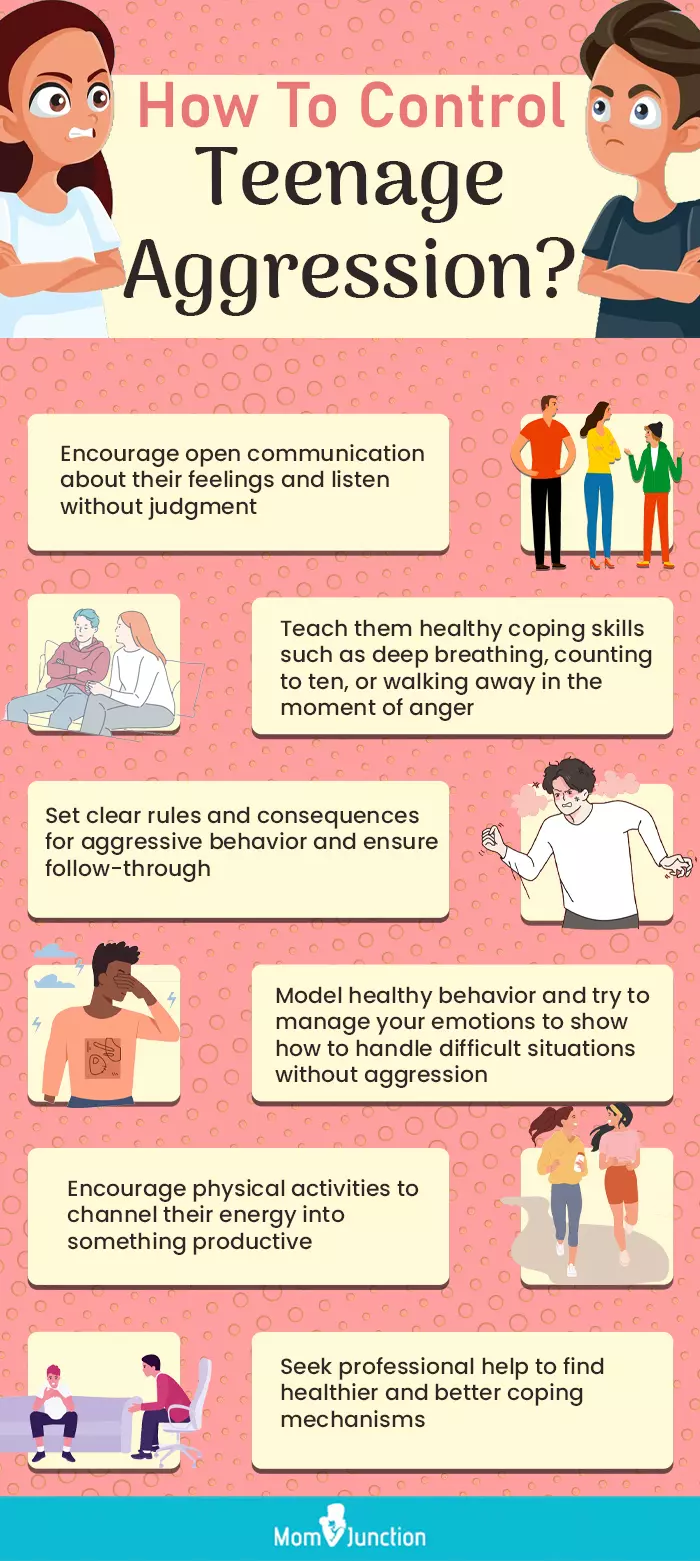
Illustration: Causes & 7 Solutions To Control Aggression In Adolescence
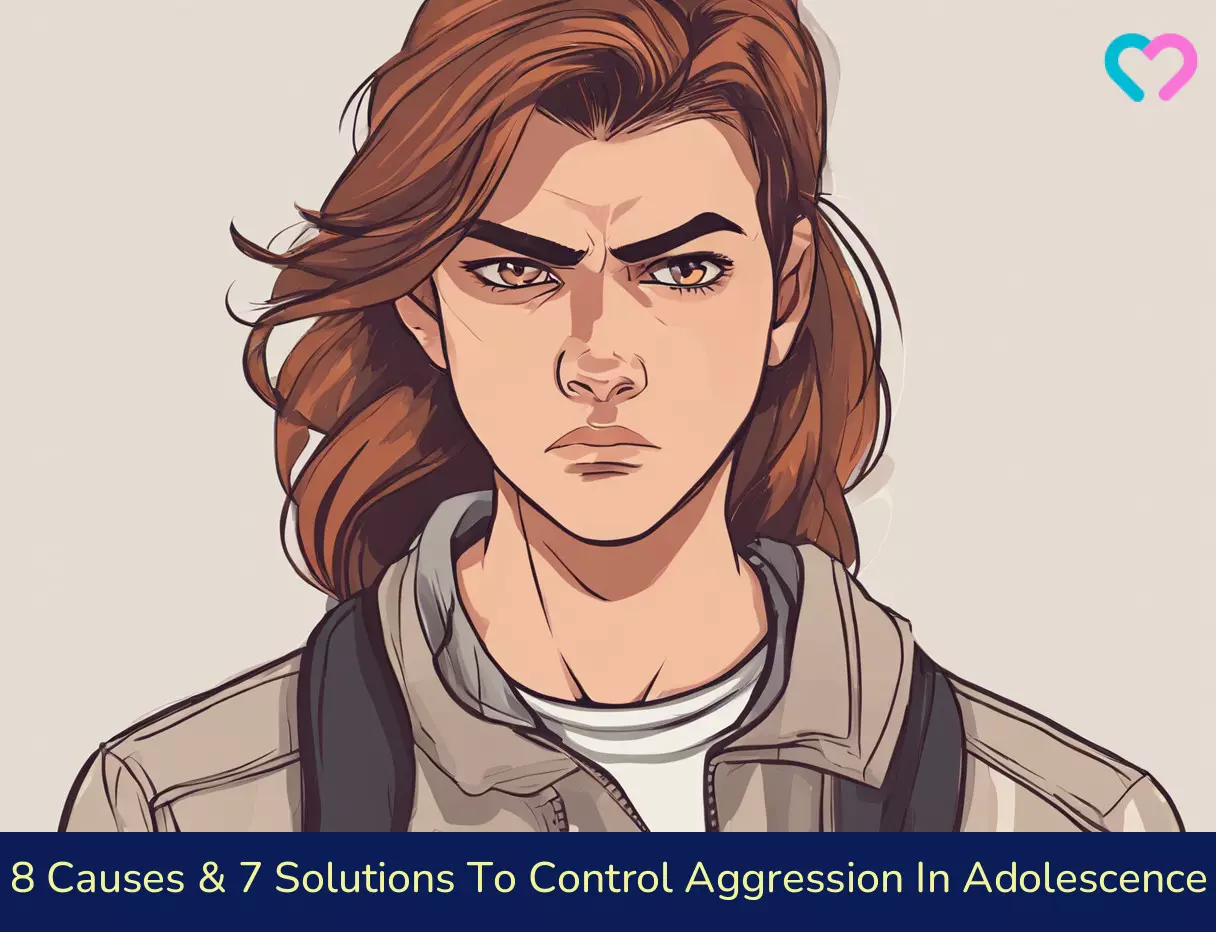
Image: Stable Diffusion/MomJunction Design Team
Gain valuable insights on anger management through this invaluable video, equipping children and adults alike with tips and strategies to maintain serenity and control.
References
- Pre-teen and teenage development – what to expect.
https://raisingchildren.net.au/teens/development/understanding-your-teenager/teen-development - Gayla Margolin; Katrina A. Vickerman; (2010); Post traumatic stress in children and adolescents exposed to family violence: I. Overview and issues.
https://www.ncbi.nlm.nih.gov/pmc/articles/PMC2811337/ - Violent behavior in children and teens.
https://www.uofmhealth.org/health-library/tv6556 - Bipolar disorder in teens.
https://www.stanfordchildrens.org/en/topic/default?id=bipolar-disorder-in-teens-90-P01618 - Panic disorder.
https://mentalhealthliteracy.org/mental-disorders/panic-disorder/ - Schizophrenia.
https://www.childrenshospital.org/conditions-and-treatments/conditions/s/schizophrenia/symptoms-and-causes - Depression in teens.
https://www.mhanational.org/depression-teens-0 - Post-traumatic stress disorder in children.
https://www.cdc.gov/children-mental-health/about/post-traumatic-stress-disorder-in-children.html?CDC_AAref_Val=https://www.cdc.gov/childrensmentalhealth/ptsd.html - Valsamma Eapen, et al; (2016); Comorbidities, social impact, and quality of life in Tourette syndrome.
https://www.frontiersin.org/journals/psychiatry/articles/10.3389/fpsyt.2016.00097/full - Social. Emotional and behavioral changes.
https://www.frontiersin.org/journals/psychiatry/articles/10.3389/fpsyt.2016.00097/full - Alcohol and drug abuse.
https://www.aacap.org/aacap/Families_and_Youth/Glossary_of_Symptoms_and_Illnesses/Alcohol_and_Drug_Abuse.aspx - Teen aggression and arguments.
https://www.nhs.uk/mental-health/children-and-young-adults/advice-for-parents/teen-aggression-and-arguments/ - Facts for Teens: Conflict Resolution.
https://web.njit.edu/~lipuma/Conflict.pdf - Marit Henriksen et al. (2025); Developmental Course andRisk Factors of Physical Aggression inLate Adolescence.
https://www.researchgate.net/publication/343930816_Developmental_Course_and_Risk_Factors_of_Physical_Aggression_in_Late_Adolescence - Katherine J. Karriker-Jaffe et al., (2009); The development of aggression during adolescence: Sex differences in trajectories of physical and social aggression among youth in rural areas.
https://www.ncbi.nlm.nih.gov/pmc/articles/PMC2773662/#:~:text=Physical%20aggression%20peaked%20around%20age - Ioanna Voulgaridou and Constantinos M. Kokkinos; (2015); Relational aggression in adolescents: A review of theoretical and empirical research.
https://daneshyari.com/article/preview/94467.pdf - Direct and indirect aggression tactics as a function of domain-specific self-esteem.
https://www.sciencedirect.com/science/article/abs/pii/S0191886915301197 - Violent Behavior in Children and Adolescents.
https://www.aacap.org/AACAP/Families_and_Youth/Facts_for_Families/FFF-Guide/Understanding-Violent-Behavior-In-Children-and-Adolescents-055.aspx - Behavioral and Emotional Issues in Adopted Children.
https://www.chop.edu/conditions-diseases/behavioral-and-emotional-issues-adopted-and-foster-children - Teen aggression and arguments.
https://www.nhs.uk/mental-health/children-and-young-adults/advice-for-parents/teen-aggression-and-arguments/ - BP G2016 Helping Children Resolve Conflict: Aggressive Behavior.
https://digitalcommons.unl.edu/cgi/viewcontent.cgi?article=1072&context=cyfsfacpub#:~:text=Aggression%20can%20be%20verbal%20or - Catherine Tuvblad and Laura A. Baker; (2013); Human Aggression Across the Lifespan: Genetic Propensities and Environmental Moderators.
https://www.ncbi.nlm.nih.gov/pmc/articles/PMC3696520/#:~:text=There%20is%20also%20some%20evidence - How Is Aggression Learned?
https://www.ojp.gov/ncjrs/virtual-library/abstracts/how-aggression-learned#:~:text=Aggression%20can%20be%20learned%20in
Community Experiences
Join the conversation and become a part of our nurturing community! Share your stories, experiences, and insights to connect with fellow parents.
Read full bio of Katherine Paxton
Read full bio of Harshita Makvana
Read full bio of Swati Patwal
Read full bio of Apoorva K






